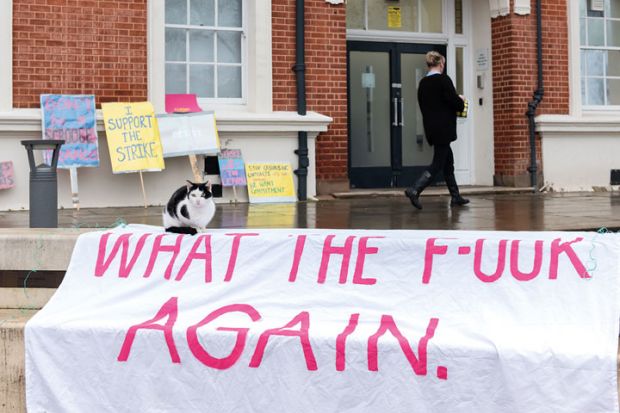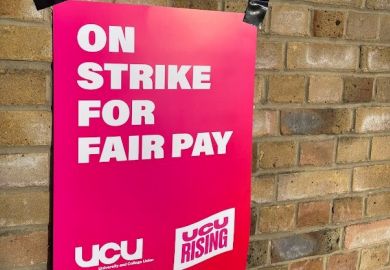The UK’s biggest higher education union faces a debate about whether to compromise on its demands over pay, pensions and working conditions, as members prepare for another round of strike action.
The University and College Union has called out members in 74 universities for 14 days over February and March, with the first walkouts on 20 and 21 February.
But some academics expressed reluctance to down tools again after an eight-day walkout before Christmas, and with little sign of a resolution to the disputes in sight.
Carsten Timmermann, senior lecturer in the University of Manchester’s Centre for the History of Science, Technology and Medicine, attracted support when he wrote on Twitter that, while he had joined picket lines in November and December, the prospect of a 14-day strike “makes my heart sink”.
Rosa Freedman, professor of law, conflict and global development at the University of Reading, complained that the “current leadership has not clearly articulated what it wants”, a view shared by Caroline Dodds Pennock, senior lecturer in international history at the University of Sheffield.
The decision to strike again was taken by the union’s higher education committee, and the walkouts coincide with elections to its parent body, the national executive committee, on which the UCU Left faction is currently strongly represented.
Results are set to be announced on 6 March, coinciding with the industrial action. It is unclear how UCU Left will perform, with members who are more closely aligned to Jo Grady, who was elected as general secretary last year, also standing.
Holly Smith, joint vice-president of the UCU branch at UCL and an NEC candidate, said that although staff were “gutted” to cancel seminars and lectures that they had worked hard on, their anger was “directed at employers who have not come far enough”.
Dr Smith, lecturer in higher education at the UCL Institute of Education, said that issues around casualisation and gender pay gaps exercised members most. This view was echoed by Adam Ozanne, a senior lecturer in the School of Social Sciences at Manchester and an NEC candidate, who added that most members looked at the extra strike days “with a mixture of trepidation and determination”.
Dr Ozanne added that the union’s leadership was “fully aware of the short-term pain, long-term gain dilemma” faced by members.
In a negotiation, “if and when offers are made, [the union] has to weigh those up. Both sides have an initial bargaining position, and it’s a matter of understanding and recognising when it is time to make a compromise. That’s inevitable in any negotiation,” he said.
When a compromise will be struck remained unclear. On pensions, the union, employers and the Universities Superannuation Scheme have been holding joint talks aimed at redrawing the fund’s governance and rethinking its valuation methodology – a key factor in determining the size of any deficit, and hence any increases in member contributions. However, the union remains adamant that employers should foot the bill for any contribution increases, a demand described by vice-chancellors as “unaffordable”.
On the other side of the dispute, the Universities and Colleges Employers Association has offered further assurances on gender and ethnicity pay gaps, workload and casualisation. However, it has refused to budge from its offer of a minimum pay rise of 1.8 per cent for 2019-20.
Dr Grady said that members remained “fed up and angry” and that while recent talks had been productive “in a way not seen before, in the sense it provided a space for positive dialogue”, the union needed “something more tangible” to avert strikes.
“I hope we can come to some shared understanding…I’m trying to ensure the best for members. It’s not incompatible with what employers want for the sector,” Dr Grady said.
Register to continue
Why register?
- Registration is free and only takes a moment
- Once registered, you can read 3 articles a month
- Sign up for our newsletter
Subscribe
Or subscribe for unlimited access to:
- Unlimited access to news, views, insights & reviews
- Digital editions
- Digital access to THE’s university and college rankings analysis
Already registered or a current subscriber? Login








